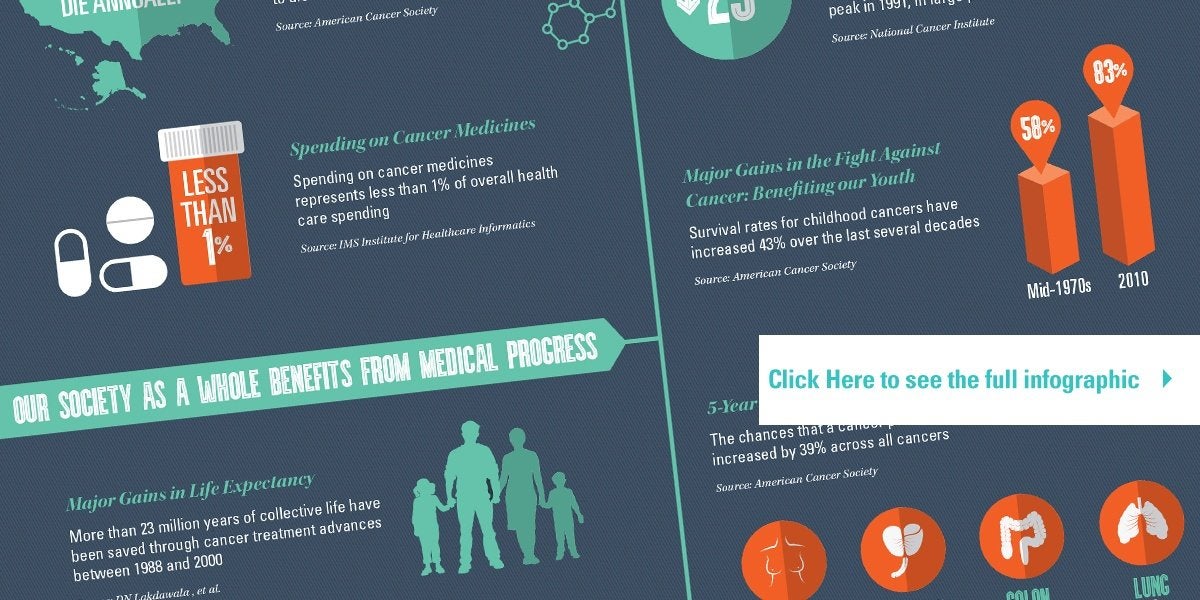Blog


Biopharmaceutical industry has made progress in cancer fight, continues work toward moonshot

Yesterday, in his final State of the Union Address, President Barack Obama endorsed Vice President Joe Biden’s call for a moonshot to cure cancer by 2020. Making advances in cancer care and finding cures for cancer, which we now know is actually more than 200 unique diseases, is also a top priority for the biopharmaceutical industry. For decades, we have been investing billions in the development of new therapies and working collaboratively with academic medical research centers, nonprofit organizations, patient advocacy groups and others on research against cancer.
In the last several decades, we have made tremendous progress in the fight against cancer, developing new medicines to treat cancer that lead to longer lives and more survivors.
We've made tremendous progress, but our commitment continues in work toward cancer moonshot
Currently, there are nearly 14.5 million survivors in the United States. The cancer death rate has declined 23 percent since its peak in 1991, in large part due to medicines, and the chances a cancer patient will live five years or more has increased by 39 percent across all cancers. Patients’ quality of life has also grown as more targeted therapies have reduced side effects and boosted patients’ ability to continue their normal lives while in treatment.
 Although great progress has and continues to be made in the fight against cancer, this complicated disease is the second leading cause of death in the United States, accounting for nearly one out of every four deaths. And cancer is among the most complex set of diseases to treat with its ability to constantly mutate and evade treatment.
Although great progress has and continues to be made in the fight against cancer, this complicated disease is the second leading cause of death in the United States, accounting for nearly one out of every four deaths. And cancer is among the most complex set of diseases to treat with its ability to constantly mutate and evade treatment.
Despite cancer presenting vexing challenges to scientists and researchers, America’s biopharmaceutical research companies are tireless in their pursuit of discovering new innovative treatments and cures. Groundbreaking treatments for melanoma and chronic myelogenous leukemia, among others, have changed the landscape for some cancer treatments, and there is more to be done. Currently, there are more than 800 medicines and vaccines in clinical testing for cancer. Eighty percent of those medicines are potential first-in-class treatments – offering a completely new way to treat cancer – and 73 percent have the possibility of being personalized medicines.
While federal government research helps lay the groundwork for drug development, biopharmaceutical companies conduct the vast majority of research and development and carry much of the associated costs. In 2014, PhRMA member companies invested more than $51 billion in R&D, meaning the biopharmaceutical sector spent more on research and development than the entire operating budget of the National Institutes of Health.
Cancer remains pervasive, but there is hope that it can one day be a chronic, manageable disease. In order to achieve this goal, we need to continue to collaborate with stakeholders across the health care system and maintain an ecosystem that supports and encourages the development of innovative new therapies. For example, we applaud Congress’ focus on biomedical innovation to accelerate new treatments and cures for patients as seen in the 21st Century Cures Act and in the Senate HELP Committee’s ongoing effort to spur medical innovation and look forward to continued work on this mission.
Learn more about our industry’s commitment to discovering new treatments and cures for cancer at www.fromhopetocures.org/cancer and on www.innovation.org.

 Stephen J Ubl
Stephen J Ubl
